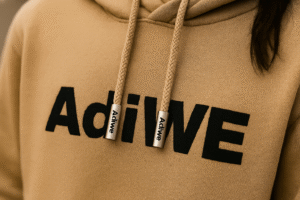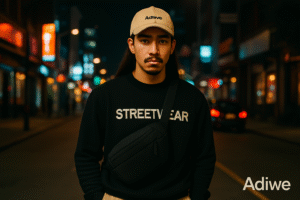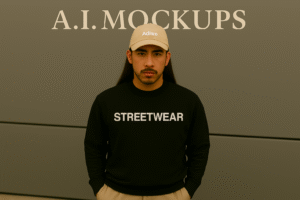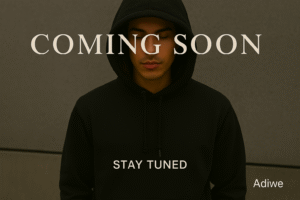Struggling to keep your streetwear line fresh? Manufacturing trends shift fast, leaving brands behind. I'll show you what’s new and how to leverage it for your business.
The latest trends include sustainability, on-demand production, advanced tech for personalization, and unique fabric innovations. These help brands create truly standout, top-quality streetwear for today's market.
Staying ahead in the streetwear game isn't just about design; it's also about how your clothes are made. For B2B wholesale clients, like trend brands and clothing brands aiming for "very trendy" collections, understanding these manufacturing shifts is key. At Adiwe, with our factory in China, we're always watching these developments to offer the best. My team and I see firsthand how these trends impact what clients from North America, England, and France are asking for. Let's explore some of the most impactful trends shaping how we create custom t-shirts, hoodies, and more.
Is Sustainable Manufacturing Becoming Standard for Custom Streetwear?
Worried about fashion's impact on the planet? Consumers demand eco-friendly options now, more than ever. Sustainable manufacturing is becoming essential for streetwear brands wanting to connect with conscious buyers.
Yes, sustainable manufacturing is a major trend. It involves eco-friendly materials, ethical labor, and reduced waste. This resonates strongly with younger consumers and trend-conscious brands globally.
!
The push for sustainability is transforming how we think about streetwear production. It's not just a niche anymore; it's fast becoming an expectation. For my B2B wholesale clients, especially those building a trend brand with a strong identity, incorporating sustainable practices is a powerful way to appeal to modern consumers. At Adiwe, we're actively working to integrate these practices.
The Rise of Eco-Conscious Consumers
Younger generations, the core demographic for many streetwear brands, are particularly concerned about environmental and social issues. They want to know where their t-shirts and hoodies come from and how they are made. This means brands that prioritize sustainability can build stronger connections and loyalty. I've seen clients like Fifty Fifty, who are always sharp about market shifts, asking more questions about our eco-friendly options. They know their customers in England care about this.
Key Sustainable Practices in Streetwear
Several key practices define sustainable manufacturing in the streetwear world. These include using eco-friendly materials like organic cotton, recycled polyester (often made from plastic bottles), or innovative materials such as Tencel™ or hemp. Another important aspect is reducing water and energy consumption during production. This can involve new dyeing techniques that use less water or investing in more energy-efficient machinery in our factory. Minimizing waste through better pattern cutting and recycling fabric scraps is also crucial. And, of course, ensuring ethical labor conditions throughout the supply chain is a non-negotiable part of true sustainability. We focus on providing customizable fabrics that also meet these criteria.
| Sustainable Practice | Description | Benefit for Streetwear Brands |
|---|---|---|
| Eco-Friendly Materials | Organic cotton, recycled polyester, hemp, Tencel™ | Reduced environmental footprint, appeals to conscious consumers. |
| Water & Energy Reduction | Efficient dyeing, modern machinery. | Lower operational impact, potential cost savings. |
| Waste Minimization | Smart pattern cutting, fabric scrap recycling. | Less landfill waste, more efficient use of resources. |
| Ethical Labor | Fair wages, safe working conditions, transparency. | Builds brand trust, ensures responsible production. |
At Adiwe, we are committed to expanding our range of sustainable options and improving our processes. We believe offering top quality also means being responsible.
Can On-Demand Production Revolutionize Your Streetwear Business?
Tired of unsold inventory and high minimum order quantities (MOQs)? On-demand manufacturing offers a flexible, low-risk solution. This approach is changing how streetwear brands, especially startups, operate.
On-demand and small-batch production minimize waste and upfront investment. They allow for testing designs and quick responses to trends, perfect for dynamic streetwear brands creating t-shirts or hoodies.
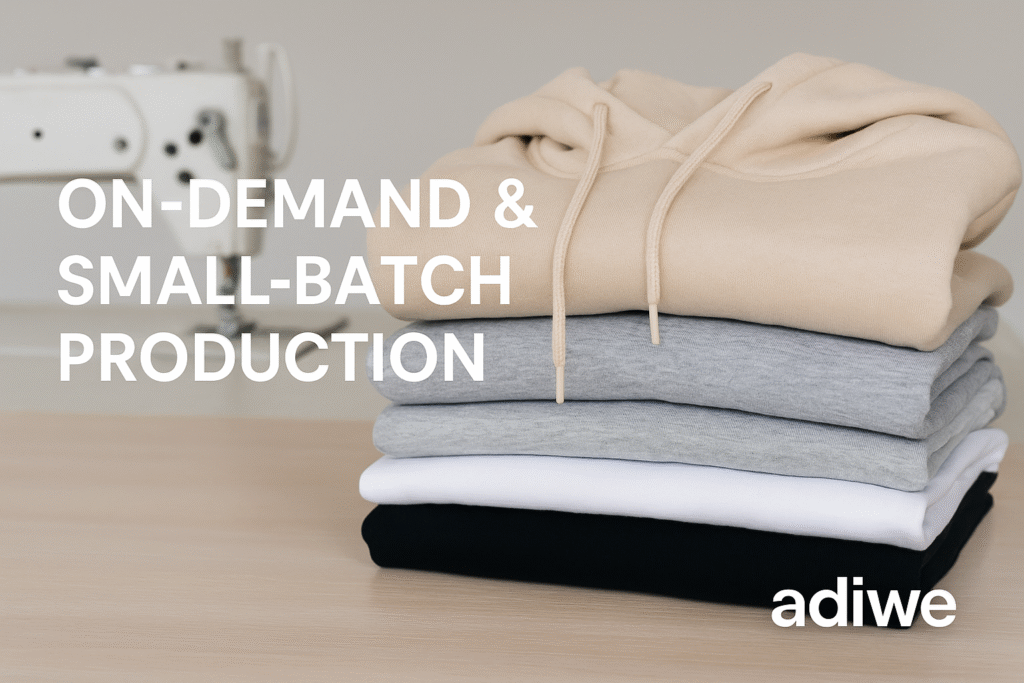
The traditional model of mass production often means brands have to order large quantities, tying up capital and risking unsold stock. This is a big hurdle, especially for emerging trend brands or clothing brands. On-demand, or small-batch, production flips this model. It’s something we're increasingly supporting at Adiwe from our factory in China.
Benefits for New and Established Brands
For new brands, the ability to order small quantities of t-shirts or hoodies means they can test different designs and styles without a huge financial commitment. They can see what sells before scaling up. This is fantastic for fostering creativity and reducing risk. Established brands also benefit. They can use small-batch production for limited-edition drops, collaborations, or to quickly respond to a sudden trend without overproducing. This agility is key in the fast-paced streetwear market. It also allows brands like those we serve in North America and France to offer more personalized design options.
Technologies Enabling Small Batches
Several technologies make on-demand and small-batch production viable. Digital printing, like Direct-to-Garment (DTG) or Direct-to-Film (DTF), is perfect for this. It allows for high-quality, full-color prints on single items or small runs without expensive screen setup costs. Advanced cutting machinery can also be programmed for small, precise batches, optimizing fabric use even for lower volumes. Our 5 production lines at Adiwe are equipped to handle varied order sizes, and we're always looking at tech that enhances this flexibility. This helps clients who need that specific craftsmanship but perhaps not in massive volumes initially.
| Feature | On-Demand/Small Batch Production | Traditional Mass Production |
|---|---|---|
| Minimum Order Quantity | Low or none | High |
| Inventory Risk | Minimal | High risk of unsold stock |
| Design Flexibility | High; easy to test new designs | Low; costly to change designs |
| Speed to Market | Faster for new/limited items | Slower due to larger production runs |
| Upfront Investment | Lower | Higher |
This model helps manage a key pain point for many businesses: cash flow and inventory risk. We aim to be a B2B wholesale partner that understands these needs.
How is Technology Enhancing Personalization in Streetwear Manufacturing?
Want truly unique streetwear that stands out from the crowd? New technologies are offering incredible personalization possibilities. Advanced techniques are making hyper-customized streetwear more accessible than ever before.
Technologies like advanced digital printing (DTG/DTF), sophisticated embroidery, and innovative fabric treatments allow for deeper personalization. This creates "very trendy," unique items with intricate logos and designs.
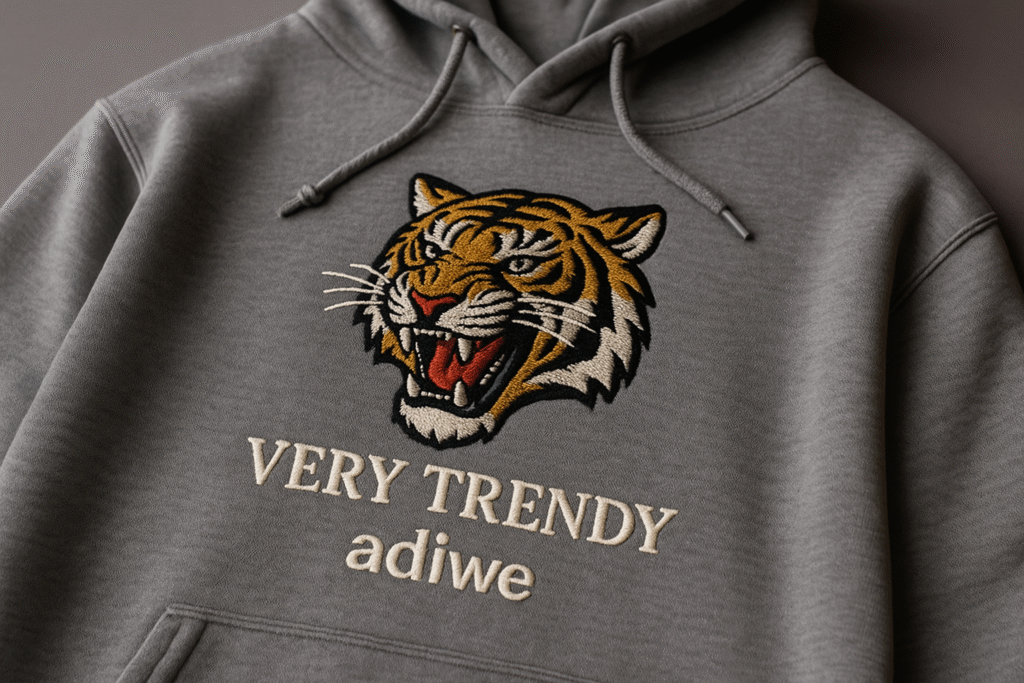
Streetwear is all about individuality and self-expression. So, the ability to offer deep personalization is a huge trend and a massive advantage for any clothing brand. At Adiwe, creating items with personalized design is core to what we do. Technology is pushing the boundaries of what’s possible for custom t-shirts, hoodies, and more.
Advanced Digital Printing
Direct-to-Garment (DTG) and Direct-to-Film (DTF) printing have revolutionized how we apply complex, multi-color graphics. Unlike traditional screen printing, there are minimal setup costs per design. This means brands can offer a wide variety of graphics, even personalized one-offs, without breaking the bank. The quality is fantastic, with vibrant colors and soft-hand feel, perfect for top quality streetwear. This is something our clients, including KOLs who want exclusive merch, really appreciate.
Sophisticated Embroidery and Appliqué
Embroidery adds a premium, tactile dimension to logos and designs. Modern embroidery machines can reproduce incredibly intricate details with precision. We can combine this with appliqué techniques, using different customizable fabrics to create layered, textured effects. This level of craftsmanship is something clients like Fifty Fifty look for, especially for their complex hoodie designs where details matter. It addresses their pain point that "many manufacturers are unable to fully reproduce their designs."
Laser Cutting and Engraving
Laser technology can be used to create precise cut-outs, intricate patterns, or even etch designs onto fabrics. This can add a very unique, "very trendy" element to streetwear pieces. Imagine delicate geometric patterns cut into a panel on a hoodie, or a subtle tonal design engraved onto a denim jacket. While more specialized, these techniques offer amazing creative potential.
The goal is to provide tools so brands can fully realize their vision. Our factory in China is equipped to handle these advanced personalization requests, ensuring the final product is exactly as envisioned for markets like England and beyond.
Conclusion
Key streetwear manufacturing trends are sustainability, on-demand flexibility, and tech-driven personalization. These help create top-quality, unique, and responsible apparel for your brand's success.

